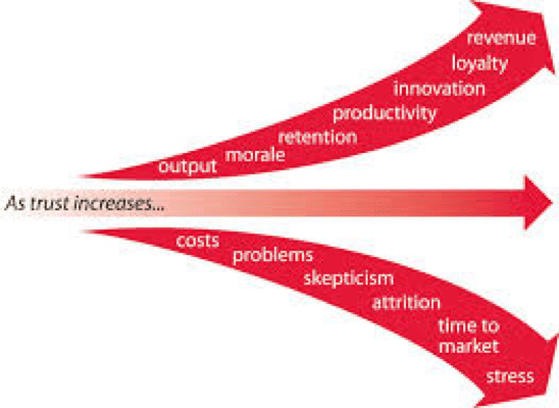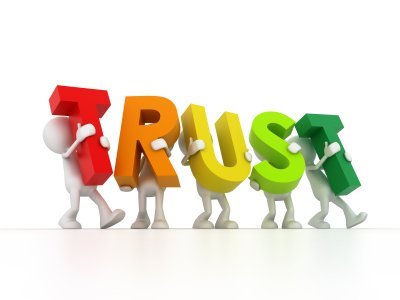Trust needs to be reciprocal and shared. We don’t trust rules, we trust people. Courage comes from leaders whose responsibility it is to protect the people working below them. People have confidence to do the right thing when they feel trusted by their leaders. It is leaders who energise the business culture to enable team members to reach their full potential, resulting in superior business performance.
Leaders cannot break trust with people and continue to influence them; it simply does not happen. Once trust is lost and the leaders influence is destroyed then team performance dwindles. Once this occurs sales are impacted as people buy from people they know, like and trust. Without trust, the organisation loses productivity, relationships, talent, customer loyalty, creativity, morale, revenue and results. This is why trust, not money, is the currency of business.
“Trust is like a mirror … once its BROKEN you can never look at it the same again…”Unknown
Lack of trust is prevalent in business today. Team members no longer trust employers to look after them. Long gone are the days when people had a job for life. Today businesses quickly downsize when economic conditions get tough. There is little loyalty from team members to employers or vice versa. The financial crisis of 2008/9 has made more and more people distrustful of banking institutions, as well as the government’s ability to handle these situations.
The diagram below clearly illustrates the consequences and impact of high versus low trust in a business:

To earn the trust of their team members, leaders must first care for their well-being and connect with them. To earn trust, trust must be extended. The best way to do this is to create a caring environment that enables people to fully engage their heads and hearts.
High Trust Environments Are Life Changing
In the VUCA world in which we now live there is only one certainty and that is change. Change is forged through relationships and the foundation of effective relationships is trust. During change trust will be tested at best and broken at worst which is why high trust relationships are essential to your change effort’s success. When you are the people you work with trust one another, you have one another’s backs as change unfolds. Instead of keeping your head down, you keep an eye on where you can step in and offer extra support. Instead of allowing change to unravel your relationships, you leverage change to strengthen your relationships.
The result is that everyone pulls together in the same direction and no-one is left behind. Communication and engagement improve as team members start asking how they can best contribute and support the change. How can they make a real difference? When the leader and team members are aligned in the right place, contributing to the right work with the right people then team members feel valued and become more highly engaged. Which only has positive benefits for the organisation as productivity and profitability increase.
“Increasing employee engagement by 10% can increase profits by US$2,400 per employee per year”. Accenture
if you’d like to learn how to increase trust and employee engagement in your organisation then please reach out to me for a conversation.





